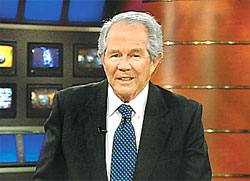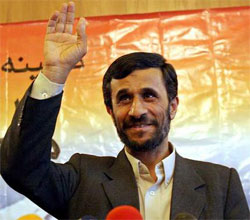Repudiating Robertson
How Can We Know When God Speaks?
For Sunday January 29, 2006
Lectionary Readings (Revised Common Lectionary, Year B)
Deuteronomy 18:15–20
Psalm 111
1 Corinthians 8:1–13
Mark 1:21–28
 |
Pat Robertson. |
After calling for the assassination of President Hugo Chavez of Venezuela, then claiming that God caused Ariel Sharon's massive stroke as punishment for conceding land to the Palestinians, Pat Robertson later claimed that Satan caused Dick Cheney's shortness of breath that briefly hospitalized the Vice President. Why? "Because he is dedicated to defeating the evildoers in Iraq, and that angered the evilest doer of all, Satan." On that same show Robertson extended condolences to California Governor Arnold Schwarzenegger, who needed fifteen stitches in his lip after "a motorcycle accident that I'm pretty sure was caused by Satan." Satan, he advised, "is no match for a Republican" (The 700 Club, January 5, 10, 2006).1
You can find extremists anywhere. In entertainment, for example, Howard Stern signed a $500 million five-year deal with Sirius Satellite Radio because public standards of decency constrained his vulgarity. Moderate Muslims must contend with Iranian president Mahmoud Ahmadinejad who called for the removal of Israel from the earth. Scientists cringe at colleagues like Hwang Woo-suk who resigned from Seoul National University in December after he fabricated data on stem cell research, or at the zealous atheism of the neuroscience student Sam Harris who in his new book The End of Faith (2005) derides all religion as a "ludicrous obscenity." The business community blushes at the numerous "Enrons" that enriched senior executives, plundered their employees, and corroded public trust. So, let it be said that conservative Christians have not cornered the market on radically repulsive fanaticisms.
 |
Mahmoud Ahmadinejad. |
But I am a Christian, so I'll repudiate Pat Robertson's remarks as not only idiotic but as indefensibly reprehensible and appalling. I believe they do harm to the Gospel, to believers, to your neighbor down the street, and, given the unfortunate scope of his influence, to the whole world. Robertson's pronouncements also provoke an important question that the Scriptures for this week raise. "How can we know when a message [has or] has not been spoken by the Lord?" (Deuteronomy 18:21).
Claims made on behalf of God run the gamut. Some of them are harmless hoo-hah and laughably ludicrous. One night in the wee hours of the morning a friend of mine could not sleep, and in the course of his channel surfing he saw a television preacher "heal" an extremely large woman. As he pressed the palm of his hand to her forehead she collapsed backwards into the waiting arms of his assistant—only to have her wig snagged off when it brushed the buttons on his blazer.
Even sincere pronouncements can make us uncomfortable, as when in a Bible study a friend boldly asserts, "God spoke to me last night and told me..." Some "ministries" look like money-laundering schemes, others make the fallacious and self-serving claim that America is an exception and has a special place in God's heart, while still others like Bruce Wilkinson's book The Prayer of Jabez pedal junk food theology that makes promises it cannot possibly fulfill ("You can have a front row seat in a life of miracles."). Most disturbing are the toxic declarations made by influential Christians like Robertson, Jerry Falwell, who scape-goated gays and feminists for the 9-11 attack, or Franklin Graham (Billy's son), who countenanced the use of nuclear weapons against Muslim countries.
So how can we know whether and when a person speaks for God?
Start with your sanctified common sense. Also, remember that speaking truth does not mean you never offend someone. The Scriptures for this week then suggest two other principles that should guide us. I consider them necessary criteria, if not by themselves sufficient, for the complicated question of validating all claims of "a word from the Lord."
 |
Hwang Woo-suk. |
First, people who speak truly for God operate with a healthy sense of the audacity of what they are attempting. They are acutely aware of the presumption inherent in claiming to speak for God. Who in their right mind would hazard such a claim given the combination of human frailty and divine inscrutability?! Every sane preacher who has ever mounted a pulpit has experienced the dread and adrenaline shock of his preposterous task—in some stumbling and bumbling way to speak a word that is true to God. This "holy hesitancy" is well-founded, too; in the Deuteronomy passage for this week the penalty for false prophecy was death. In the epistle for this week Paul warns believers who were overly confident about their Christian knowledge: "The person who thinks he knows something does not yet know as he ought to know" (1 Corinthians 8:2).
Whereas some ministries eagerly promote personality cults, simplistic formulas, and authoritarian appeals, the desert monastics of the fourth and fifth centuries actively shunned clerical responsibility. They were decidedly reluctant to speak and act for God. John Cassian (c. 360–c. 435) judged it a trick of the devil to "inveigle us into desiring the holy clerical office under the pretext of edifying many." Evagrius (c. 345–399) even described clerical aspiration as "the source and root of the love of power." Thus, when a saint asked Abba Theodore, "Speak a word to me for I am perishing," the old man replied sorrowfully, "I myself am in danger. So what can I say to you?" For these early ascetics renunciation, obedience, and confession of thoughts to an elder were a necessary check on trusting your own judgment—"of all evil suggestions, the most terrible" (Isidore the Priest). Uncritical acceptance of your own ideas, impulses, and inclinations was a sure sign of spirituality run amuck. They were especially dubious of over zealous piety that expressed itself in what Cassian called "immoderate and inappropriate fasting or severe vigils or inordinate praying or excessive reading."
Second, Paul insisted that concrete deeds of love accompany genuine claims of divine knowledge: "Knowledge puffs up, but love builds up" (1 Corinthians 8:1). In Mark's Gospel we read that people were amazed at Jesus's authority and his "new teaching." But in marked contrast to how the religious establishment operated, writes Mark, his was an authority that authenticated itself by fostering human healing and wholeness (Mark 1:21–28). Cassian called this "integral wholeness," and we wish it not only for ourselves but for every human being.
 |
Mother Teresa. |
Here too the ruthless realism of the monastics can save us from foolishness that masquerades as wisdom. Those grizzled monks experienced every sort of pompous pronouncement, spiritual fraud and pious pretense. They knew what it meant for a deluded believer to be "deceived by his innumerable revelations and [wrongly] believe that he was a messenger of righteousness." Their antennae were especially sensitive to what Cassian called "specious authority" and loveless judgmentalism. Rather, they counseled an unqualified compassion toward human weakness, a consideration for frailty, and heartfelt empathy for those who struggle. Christians truly close to the heart of God "never frighten with bleak despair those who are in trouble or unsettle them with harsh words." They gladly, fully, and freely proclaimed that God alone was "the gracious arbiter of hidden strength and human infirmity." They looked "with a kind of overwhelming wonder at his ineffable gentleness." So should we.
I've made my own share of stupid remarks. Thank God I was not on television, nor did I command an audience of millions. My poor judgment on those occasions has reinforced my beliefs about the necessity of theological modesty, and the primacy of love. I do believe that God speaks today, but given the cacophony of voices ranging from the goofy to the godly, hearing what He says demands that we distinguish between what engineers call the signal to noise ratio.
For further reflection:
* Do you feel that God has ever spoken to you? When and how?
* How do you feel when others make this claim? Why?
* In your opinion who today speaks truly for God? What distinguishes them?
* See Charles Kimball, When Religion Becomes Evil; Five Warning Signs
[1] After complaining that the media had misquoted him, and denying that he had made the remarks about Sharon, on January 11, 2006 Robertson issued a letter addressed to Sharon's son Omri in which he apologized for his remarks as "inappropriate and clearly insensitive," and asked for forgiveness from both Omri and the nation Israel. See http://www.cnn.com/2006/US/01/12/robertson.apology/index.html.





